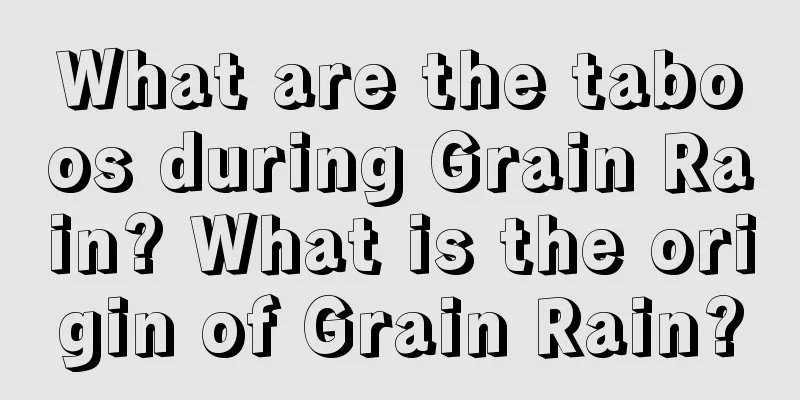What are the taboos during Grain Rain? What is the origin of Grain Rain?

Introduction: Guyu means the harvest of all kinds of grains in life. It falls on April 20 or 21 every year. What are the taboos during Guyu? An ancient poem says, "Fireworks are everywhere in Yangzhou in March." With the arrival of the third month of the lunar calendar, a riot of colour competes for beauty. For more details about the 2018 lunar calendar for March, please visit the Fortune Teller website for consultation!What are the taboos during Grain Rain?It is taboo not to rain . There is a farmer's proverb about Grain Rain: "It should be sunny on Qingming Festival and rainy on Grain Rain. If there is no rain on Grain Rain, people will cry for rain later." Most people believe that if there is no rain on Grain Rain, there will be drought that year, and there will be no good weather, crops will not grow well, and there will be no good harvest. There are also agricultural proverbs that say: "It is gloomy in Grain Rain, and it rains heavily in Beginning of Summer" and "If it rains in Grain Rain, there will be no dry soil for forty-five days." Therefore, rain during Grain Rain is a good sign. No rain during the Grain Rain Festival is also a sign of famine, and people are wary of it. In the Longshan area of Hunan, it is considered auspicious if it rains on the Grain Rain Day. There is a saying that "Qingming should be bright, and Guyu should be dark." Mencius said: " If you plant mulberry trees in a house of five mu, people aged fifty can wear silk clothes." In a sense, the mulberry forest has become a symbol of the ancients' ideal country. Wherever there is a village, there must be a mulberry forest. “Silkworms turn white three days after Grain Rain.” Before and after Grain Rain, no one is allowed to visit neighbors. Even officials from the government office are not allowed to go to the countryside, so as not to offend the silkworm god. The ban will be lifted only after the silkworms have returned to the mountains and offered sacrifices to the silkworm goddess Leizu. Do not prevent fires outdoors In the Zhuang ethnic group areas of China, it is taboo to set fires outdoors on Grain Rain Day. The local elders believe that Grain Rain is a good time for rain. Setting fire in the wild on this day will anger the God of Thunder and the Goddess of Lightning, who will take revenge on the human world by not letting it rain. This will cause continuous drought among the people and affect agricultural production. Therefore, even if people go to visit graves and tombs on this day, no one will set off firecrackers, burn incense, or burn paper money in the wild.What is the origin of Grain Rain?Among the people, there is a story circulating in Guanzhong, Shaanxi Province: It is said that more than 4,000 years ago, Emperor Huangdi was in urgent need of an official historian who was in charge of historical materials. One day, Huangdi discovered Cangjie, a man of outstanding virtue and talent, and appointed him as a historian. He used knotted ropes to record events, and remembered national affairs clearly, which was highly appreciated by Emperor Huang. Later, the knotted rope record system became increasingly outdated. Once, Cangjie went hunting with a hunter. The hunter pointed to the traces of various wild animals left on the ground and told where the animals had gone. Cang Jie was deeply inspired: "A footprint represents a thing!" After returning home, Cang Jie packed his luggage and went out to investigate. He climbed mountains and waded through water, asked questions without hesitation, and described everything he saw according to its characteristics. The first characters were created based on pictograms. Because of his contribution to creating characters, the Emperor of Heaven was moved. At that time, the world was suffering from a famine, so he ordered the heavenly soldiers and generals to open the granary in the Heavenly Palace, and it rained millet, and all the people in the world were saved.After Cangjie died, people buried him in his hometown, the north of Shiguan Town, Baishui County. A couplet was engraved on the door of his tomb: "The rain of millet in those days moved the Emperor of Heaven, and the same writing will forever be paired with Qiaoling." People set the day for worshiping Cangjie as the day when the millet rain fell, which is now the "Guyu Festival." Nowadays, on the day of the Grain Rain solar term, a temple fair to worship Cangjie is held in Shiguan Town, Baishui County. Summary: The above is [What are the taboos of Guyu? What is the origin of Grain Rain? 】, I hope the entire content can be helpful to everyone! |
<<: What are the precautions during the Grain Rain solar term?
Recommend
Is November 18th of the lunar calendar in 2021 a good day for engagement? Is it auspicious to get engaged?
The eleventh month of the lunar calendar is the se...
What is the Beginning of Spring and how did it develop?
Introduction: The Beginning of Spring is the first...
Is the sixth day of the eleventh lunar month in 2019 a good day? Is today an auspicious day?
Introduction: Different days have good and bad luc...
What solar terms come after the winter solstice? What solar term comes after the winter solstice?
There are twenty-four solar terms in a year, and t...
What is the date of the fourth day of the first lunar month in 2019? Is the fourth day of the first lunar month in 2019 a good day?
Introduction: Every lunar calendar has a correspon...
Fate analysis of girls born on February 18th of the lunar calendar in 2022. What is their fate?
Many children are born every day, and their fates ...
2019 June 7th auspicious time, time and taboo query
The wind and rain in June, drop by drop, hit the ...
Can a funeral be held on the tenth day of the seventh lunar month in 2021? What should we pay attention to during a funeral?
Chinese people like to choose auspicious days for ...
The fate of a baby girl born on the fourth day of the ninth lunar month in 2022
Understanding in advance the impact of a child’s f...
Diet for good luck during the 24 solar terms: What can and can’t you eat during the Beginning of Heat in 2021?
Chushu is the 14th solar term among the 24 traditi...
When is the autumnal equinox this year? How lucky or unlucky is it?
Vegetables during the White Dew and Autumnal Equin...
Can I travel on the sixth day of the fifth lunar month in 2021? Is the day good?
Since ancient times, people have liked to seek goo...
What day is Bailu? Is Bailu the solar term with the largest temperature difference in the year?
Introduction: Bailu solar term is one of the impor...
What are the do's and don'ts on the first day of the seventh lunar month in 2020?
What are the do's and don'ts on the first...
Is February 27, 2020 - Spring Equinox (March 20) a suitable date for visiting graves?
Introduction: Generally, you need to choose an aus...









